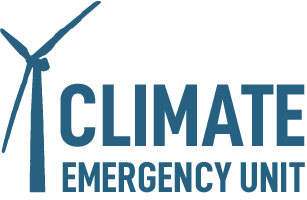2024 Year-End Report
2025 will be the final year of the Climate Emergency Unit. This is by design; the CEU was always intended to be a five-year project, focused on the immediate need to confront the climate crisis in the first half of this crucial decade. Some of our initiatives and campaigns may well live on past 2025, but if they do, they’ll find a home within other organizations.
That said, our team is fully committed to go out swinging, ready to leave it all on the field in our final year (forgive the sports metaphors). At some point in 2025 there will be a federal election with so much at stake, especially when it comes to Canada’s response to the worsening climate emergency. And since the Climate Emergency Unit doesn't have to worry about charitable status, we are free, ready and willing to do everything we can as a small team to make a difference.
We are excited to share some of the highlights from the past 12 months of organizing and mobilizing with you below, and lay out our intentions for 2025 — a pivotal year for climate policy in Canada. If you believe in our transformative campaigns, we invite you to make a substantial contribution to help us win them in our final year. You can find ways to do that at the end of this report.
About the Climate Emergency Unit
“The climate emergency requires a new mindset — to mobilize all of society, galvanize our politics and fundamentally remake our economy.”
The Climate Emergency Unit (CEU), a project of the David Suzuki Institute, is a 5-year initiative to mobilize Canada to confront the climate crisis. The overarching goal of the CEU is to press for the implementation of wartime-scale policies to confront the crisis, like we tackled an earlier existential threat – the rise of fascism during the Second World War.
The CEU’s mission is to mobilize Canadians to press politicians to implement climate emergency legislation and policies that dramatically reduce Canada’s GHG emissions to ensure we meet IPCC-compliant targets.
We seek to move leaders at all levels of government – federal, provincial, municipal and Indigenous – and across civil society, to meet the climate crisis at the speed and scale required by following our 6 Markers of Climate Emergency framework:
Spend what it takes to win
Create new institutions to get the job done
Shift from voluntary and incentive-based policies to mandatory measures
Tell the truth about the severity of the crisis and communicate a sense of urgency
Leave no one behind
Centre Indigenous leadership, rights and title
Once we close our doors, the 6 Markers will be a legacy we leave behind with the hundreds of organizations and organizers across sectors with whom we’ve worked. A major goal of this final year is to deeply embed this framework in the discourse and outlook of the climate movement and society at large.
State of climate action 2024
Speaking of telling the truth, let’s be honest. Climate actions and commitments in Canada have slowed this year. We are losing ground.
Climate has receded as a priority issue for many Canadians, as people understandably focus on the cost of living crisis and other immediate concerns. However, we at the CEU contend that the climate and affordability crises are deeply intertwined. We’ve also emphasized, both to governments and within the climate movement, that no response will be effective without confronting both crises concurrently. The whole point of our flagship Youth Climate Corps campaign is to present a hopeful economic alternative in the form of well-paying jobs and career development for young people, many of whom (particularly young men) are increasingly enticed by the populist right. The Youth Climate Corps seeks to make these young people an offer that speaks to their better selves.
So, even as we see the growth of fossil fuel extraction – new LNG proposals and oilsands production expansion – on the horizon, more frequent and severe unnatural disasters, set against a painfully slow dip in Canada’s carbon emissions that is out of step with the speed and scale that science and justice demands, we are not giving up. And neither should you.
We continue to fight for truly transformational policies that invite Canadians to join in a grand societal undertaking. For policies that make a compelling and hopefully counter-offer to workers and communities that feel economically reliant on fossil fuels. For the creation of audacious new institutions and to spend what it takes not only to confront the climate crisis, but also to forge a more equal and just society.
We hope you will join us in this fight in our final year.

